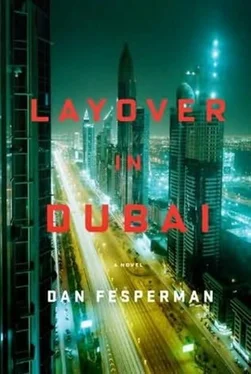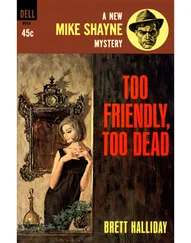“Please tell Ali,” he wrote, “Zafar is no help.”
He wondered if Nanette had posted any new alerts. Ansen’s password offered the only possibility of finding out, but he wasn’t at all surprised by the response.
Access denied. Password invalid.
What was surprising was that he was then unable to exit the page. Either the dial-up connection was getting even slower or something else was happening. He tried various escapes, but nothing worked. Only a reboot would do the trick, and even that seemed slow in coming. He had to press the OFF button for several seconds before the machine finally gasped and the screen went blank. This, of course, sent the shopkeeper into a rage.
“No turn off! No turn off! You pay ten dirhams, please, for losing connection.”
He paid it, scowling, and left the store, but couldn’t shake the sense that he’d blundered. And even with his impromptu bodyguards, he felt like a marked man.
They got to the room with only a few minutes to spare. All was quiet. To no one’s surprise except Sam’s, Ramesh’s empty bed had already been filled by a replacement worker, who was tucking in the corners on a fresh set of sheets. Maybe the angry Bengalis would come up with a conspiracy theory for him as well.
Everyone settled in for the night. Vikram nodded reassuringly from his bunk. Then the lights went out. Sam lay awake for a while, startled by every noise and creak. He kept expecting the door to fly open, and Ramesh’s friends to barge in with belts and kitchen knives, or whatever else they used around here. But he was so exhausted that he soon gave way to the rhythms of the night, and was sleeping soundly. Not even the mice and the bugs that scampered across his legs in the dark could rouse him.
He came awake only when a strong hand clamped firmly and moistly onto his mouth. He kicked out with both legs, and struggled to raise himself, or cry out, but to no avail. From a rush of night air he knew that someone had opened the door, and in the distance he heard the sound of police sirens, moving closer. Some sort of scuffle was in progress around him, and there were angry voices. He kicked again in an absolute panic, and wrenched a hand free.
Then a rag came down across his nostrils, smelling strongly yet sweetly of chemicals, and within seconds he was fading from consciousness just as more hands were lifting him into the air. Next came a dreamlike sensation of falling, the air so thick that it arrested the speed of his plunge. The concrete floors of the building in the Marina area flashed past him, one by one. He tried to grab at them, but the fumes kept pushing him downward, with a host of shadows in pursuit.
His last thought was to wonder if he would ever reach the bottom.
The first thing Sharaf saw was the Minister, bending over his face to place a cool washcloth against the lump on his forehead. It stung. Sharaf winced.
“You’re conscious!”
“Where is everyone? What are you doing at the prison?”
“You’re at my villa, free and safe. For now, anyway.”
Sharaf tried to sit up but his head swam so he lay back on the pillow.
“I should phone the doctor, fetch him back here,” the Minister said. “He predicted you might soon be up and about. He advised that you stay put for a while.”
“How long have I been out?”
“Almost five hours.” He checked his watch. “Yes, five.”
The Minister wore an elegant and spotless kandoura . The room was like something in a top-notch hotel. Sharaf had never been in the man’s house-in fact, their only face-to-face meeting had occurred in an anteroom of Zabeel Palace-but he had seen it from the outside. Just about everyone in Dubai had, either in person or in a photograph. The huge, modernistic three-story villa, with its curved walls of stone and reflecting glass, stood out even among the other ostentatious homes in Jumeirah’s wealthiest corner.
Sharaf realized he was no longer wearing his prison garb. Someone had dressed him in a freshly laundered kandoura . The sheets were soft, lightly scented. He could easily have shut his eyes and slept all day, but too many questions were already on the prowl, and still more were lining up to join them as his life slowly regained focus.
“There was a riot,” he said, remembering. “The guards went crazy. I found a potential witness in there.”
“A riot? The warden only mentioned a small fight. You and some lifer with a red stripe.”
“The warden’s lying. He’s covering for his thugs.”
Sharaf gently removed the damp cloth from his forehead, then touched the tender lump at his hairline. It felt like a coconut was trying to force its way out of his skull. He again tried to sit up, and this time was able to prop against the headboard with minimal dizziness, although the lump throbbed violently.
“Easy, Sharaf. Easy.”
“Why did you bring me here?”
The Minister shrugged.
“You know how our hospitals are. The best that money can buy, but somehow never quite good enough when something bad happens. Why else would the royal family always seek treatment overseas anytime one of them sneezes?”
“The Iranian hospital isn’t so bad.”
“It’s first-rate. But considering some of the enemies you’ve made recently, well, I couldn’t be sure of your safety.”
“Ah, yes. Thank you.”
“You see? Your powers of judgment are still clouded. My personal physician predicted it. He is a German, trained in Boston, and he advises you to go slow for a while. I agree, of course. But I also have some advice.”
“And what would that be?”
“You must tell me where the American is. Assad is a lying fox, but I believe he knows something that you’ve been hiding from me.”
Sharaf had no way of knowing what the Minister might have heard or learned while he was unconscious, but as the fog continued to lift he tried to gauge what he might say without tripping himself up. Evasiveness was one approach, and his injury offered possible cover.
“What do you mean, sir? You’re confusing me.”
“Well, obviously no one has found him yet. But I’m guessing you have known all along where he is.”
“Look me in the eye, sir, because I am going to tell you the absolute truth.” To his surprise, the Minister actually leaned forward over the bed, gazing intently. “I haven’t the faintest idea where Mr. Keller might be. For all I know he might even have left the country.”
The beauty of it was that Sharaf hadn’t had to lie, not technically, which made his deception all the more convincing. He didn’t know where Keller was, not at the moment. The Minister eyed him a few seconds longer, then pronounced his judgment.
“I believe you. Up to now, I’ll admit, I wasn’t so sure. But just now, looking you in the eye, man to man, I am convinced you are being honest with me. But where do you think he has gone? Surely you must have an opinion?”
“Honestly?”
“Of course.”
“I believe he is dead. Or will be soon. Either by the hand of his own people, or Assad’s.”
“And where does that leave your case?”
“It complicates it, of course. That would mean five murders so far, counting the woman in the desert and the two Russian thugs. And I still don’t know what the rest of them are up to.”
Unfortunately, Sharaf believed his dire assessment of Keller’s prospects might actually be true. Unless the young man had managed to cross the border or put to sea during the past few days, his hopes for survival were slim. It saddened him, because he liked the fellow. But perhaps Ali had been able to pull something together.
Thinking of Ali reminded Sharaf of all the work he needed to do-phone calls, contacts, follow-ups. Adding to his anxiety was the date Charlie Hatcher had scribbled into his black book, underlined twice-“Monday, 4/14!” It had taken on the feel of a deadline, a point of no return, and now it was Saturday the 12th. Only two days left.
Читать дальше












